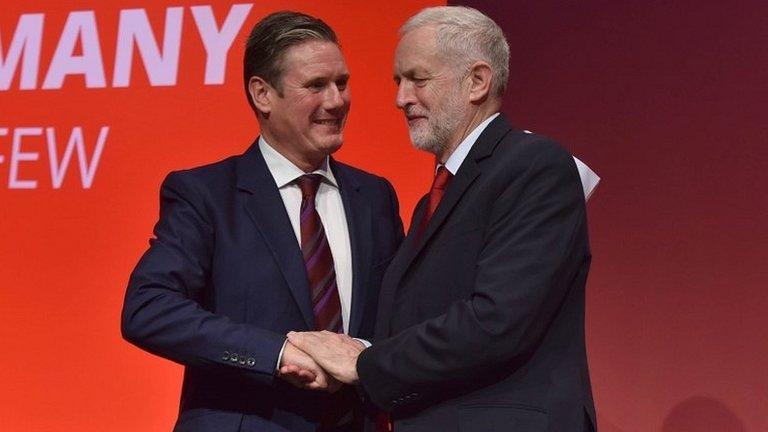Not the end of the affair for Labour
- Published

It is only three weeks since the Equality and Human Rights Commission (EHRC), an independent legal body, said Labour - the party set up to fight for equal rights - had breached the law during Jeremy Corbyn's time in charge.
If you look at this page every now and then, you won't need any reminding about the level of angst there has been in the Labour Party over racism against Jewish people in the last few years.
But this is what happened when the independent official body gave its verdict last month after several years of terrible division and upset.
When the report came out, Mr Corbyn suggested it had all been exaggerated, so got booted out of the Labour Party and told that he could not sit as a Labour MP.
He was still in the Commons, of course - that is voters' decision - but he lost the party whip. In other words he was chucked out of the parliamentary party too.
But after clarifying what he had said, although still not apologising for what happened, he got let back into the party itself on Tuesday, following a decision by a panel of party officials.
You won't be surprised to know that was not the end of the affair.
While Mr Corbyn's noisy band of supporters were jubilant that the former leader was back in (don't forget how extraordinary it was that the man who was leader less than a year ago was ejected), his readmission provoked outrage among much of the Jewish community and horror among some Labour MPs.
That was not, therefore, the end of it. This is the Labour Party, after all.
Despite frantic interpretations of the party's rule book, Mr Corbyn's readmission to the party did not mean that he would automatically be allowed to sit again as a Labour MP.
That decision was to be taken by the Labour leader, who not long before the weekly joust at Prime Minister's Questions made the announcement that his predecessor would not be let back in.
'Clarification'
Cue on Wednesday night, howls of outrage from Mr Corbyn's backers - a familiar vocal group of some union leaders, prominent campaigners and a couple of dozen or so MPs. It's also true that the decision will cause upset among some party members.
The Labour leader's office had prior knowledge of the "clarification" that Mr Corbyn was going to offer.
So why did the row about letting Mr Corbyn sit as a Labour MP again emerge, and even appear to take senior MPs by surprise?
Given the level of upset in much of the parliamentary party over the EHRC report and Mr Corbyn's attitude to this issue there was an immediate push back from many MPs after news of his readmission to the party.
And the strength of feeling was made clear to the leader's team. If Sir Keir had allowed his predecessor to take his place once again on the Labour green benches, it's quite possible that some of his colleagues there would have argued again and again to exclude him, dragging out the rows over this issue that the leadership is so desperate to leave behind
There is no doubt Mr Corbyn's supporters will keep objecting loudly to what has happened, and that could get extremely bumpy, but cracking down on anti-Semitism is meant to be at the top of Sir Keir's to-do list.
If he wanted to keep the promise he made solemnly to the Jewish community, did he really have any choice?
His allies are adamant this is not a fight the leadership wanted to pick.
The BBC understands that Labour's NEC disputes panel asked Mr Corbyn to delete his original Facebook post, in which he claimed opponents had "dramatically overstated" the scale of anti-Semitism within Labour for political gain.
It's understood this was a suggestion from officials on the panel rather than a requirement. The original post is still on his Facebook page.
But given the situation, it is still a moment when Sir Keir can demonstrate what he wants to convince the public of - that his leadership really does mark a change.
